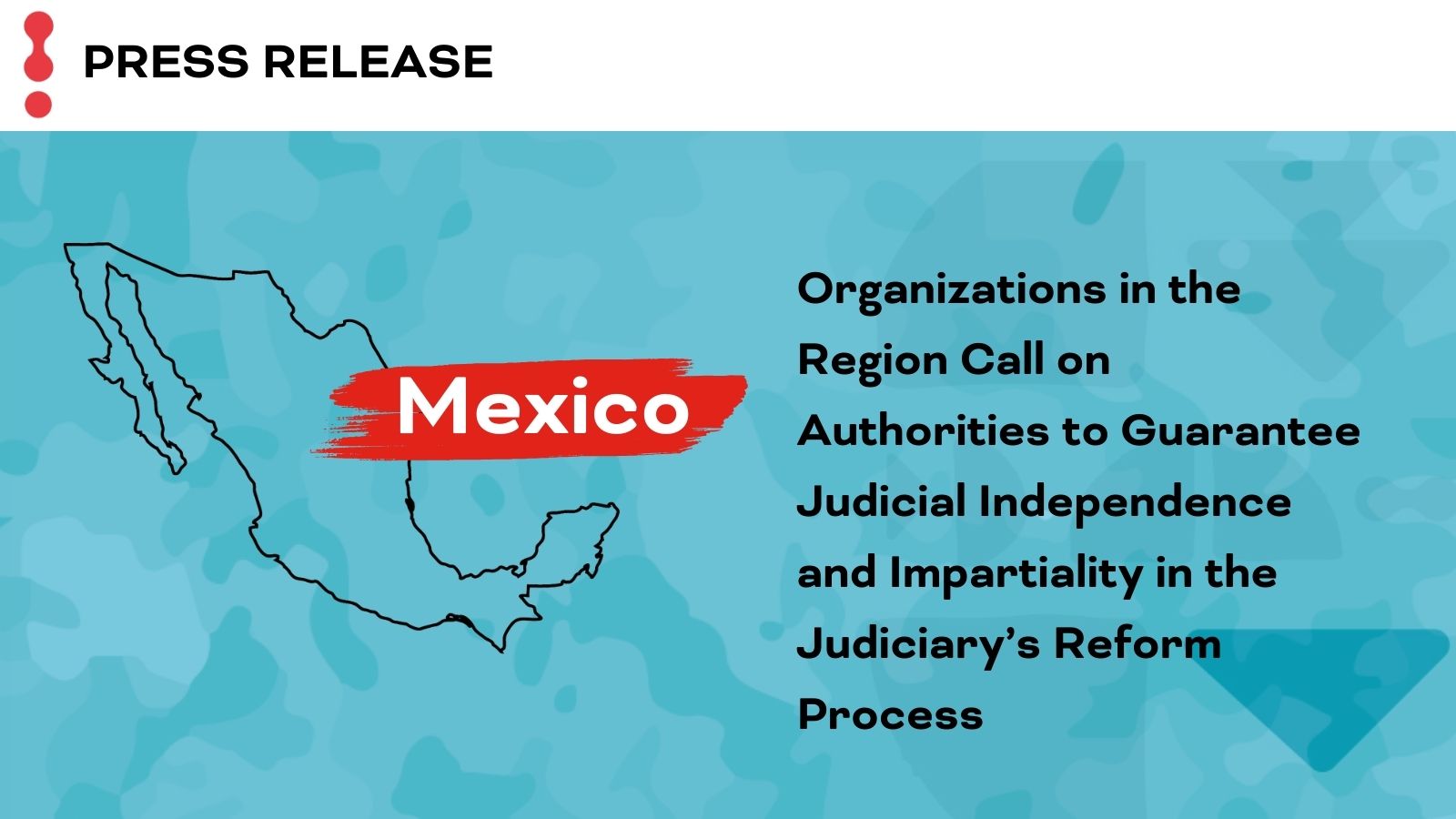






September 6, 2024. The undersigned civil society organizations express our concern over the approval on September 4 by the Chamber of Deputies of the reforms to the Judiciary in Mexico. As the United Nations Special Rapporteur on the Independence of Judges and Lawyers has already cautioned, these reforms heighten political influence over judicial appointments, thereby posing a serious threat to the independence of the judiciary in the country. For this bill to become law, it still needs to be voted on and approved in the Senate.
The reform proposes that all judges, including Supreme Court justices, be elected by direct popular vote based on nominations put forth by the three branches of government. This raises the risk of undue influence over the judiciary by political actors and organized crime, ultimately compromising judicial professionalism. Moreover, the application of the bill would lead to the massive dismissal of approximately 1,800 judges, violating the guarantee of irremovability, and would have a direct impact on citizens’ access to justice. Additionally, the reform introduces the figure of “faceless judges”, widely rejected by international human rights organizations for violating judicial impartiality and independence, as well as the right to defense. Another troubling aspect of the reform is the elimination of the Federal Judicial Council, transferring disciplinary authority to a Court of Judicial Discipline. This court would apply vague disciplinary standards, with no possibility of appeal for the affected judges.
We urge Mexican authorities, particularly the Senate, to thoroughly evaluate the proposal and its impact on the independence and impartiality of the judiciary, considering the warnings from international human rights mechanisms. The judiciary’s role as a guarantor of rights and freedoms and as a counterbalance in a democratic rule of law must remain a fundamental principle. Any reform should be grounded in an objective assessment, offering solutions that address identified issues and are supported by technical and empirical evidence from successful analogous experiences.
The Mexican Congress must ensure that these reforms comply with international standards and establish a judicial selection process based on merit and qualifications, with the effective participation of civil society, free from political motivations. It is essential to safeguard judicial independence, enabling judges to perform their duties without external interference or pressure. Furthermore, the reforms must ensure adequate budgetary provisions to guarantee access to justice for all.
Until the Mexican people’s right to an independent and impartial judiciary is secured, the international community must remain vigilant. Failure to ensure this threatens the separation of powers and the rule of law—fundamental pillars of any democratic system.
Signatory organizations:
| Acción cívica contra la corrupción | Chile |
| Acción Solidaria | Venezuela |
| American Friends Service Committee, Oficina Regional para América Latina y el Caribe (AFSC LAC) | Regional |
| Apuesta Solidaria AC | México |
| Asociación Pro Derechos Humanos | Peru |
| Centro Regional de Derechos Humanos y Justicia de Género – Corporación Humanas | Chile |
| Center for Justice and International Law (CEJIL) | Regional |
| Comisión Mexicana de Defensa y Promoción de los Derechos Humanos | México |
| Comité de América Latina y el Caribe para la Defensa de los Derechos de las Mujeres CLADEM | Regional |
| Consultora Solidaria SC | México |
| Defensa de Niñas y Niños – Internacional, DNI Américas | Costa Rica |
| Demus estudio para la defensa de los derechos de la mujer | Perú |
| Due Process of Law Foundation (DPLF) | Regional |
| Equipo de Reflexión, Investigación y Comunicación de la Compañía de Jesús en Honduras (ERIC-SJ) | Honduras |
| Equipo Jurídico por los Derechos Humanos | Honduras |
| FLAM | Latinoamérica |
| Fundación para la Justicia | México |
| Incide Social AC | Mexico |
| Instituto de Defensa Legal (IDL) | Perú |
| Instituto para la Economía y la Paz | México |
| Mesa Nacional para las Migraciones | República Dominicana |
| Movimiento Autónomo de Mujeres | Nicaragua |
| Observatorio de Derechos y Justicia Ecuador | Ecuador |
| Oficina Jurídica para la Mujer | Bolivia |
| Paz y Esperanza | Perú |
| Proyecto Paz | México |
| Red de Salud de las Mujeres Latinoamericanas y del Caribe (RSMLAC) | Chile |
| REDIM | México |
| Robert F. Kennedy Human Rights | Internacional |
| Vicaría de Derechos Humanos de Caracas | Venezuela |
| Washington Office on Latin America (WOLA) | Estados Unidos |